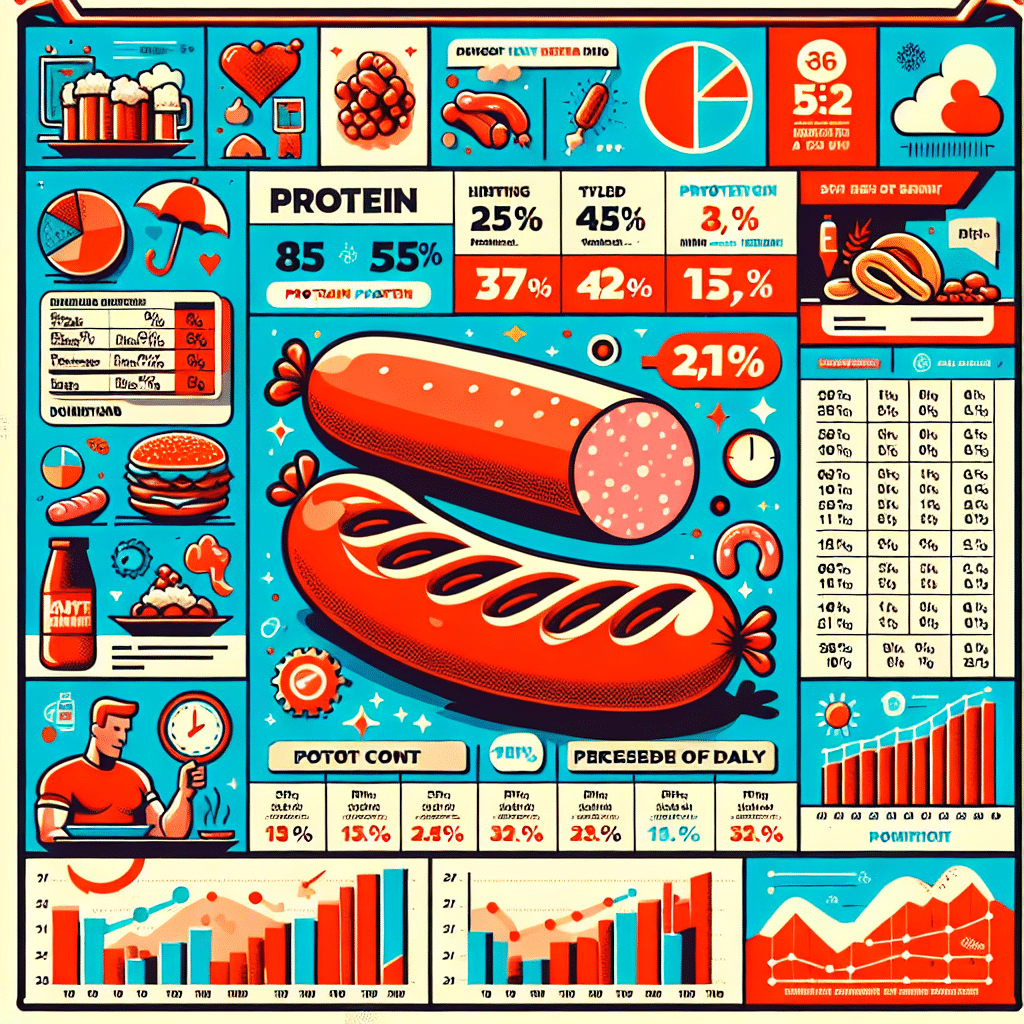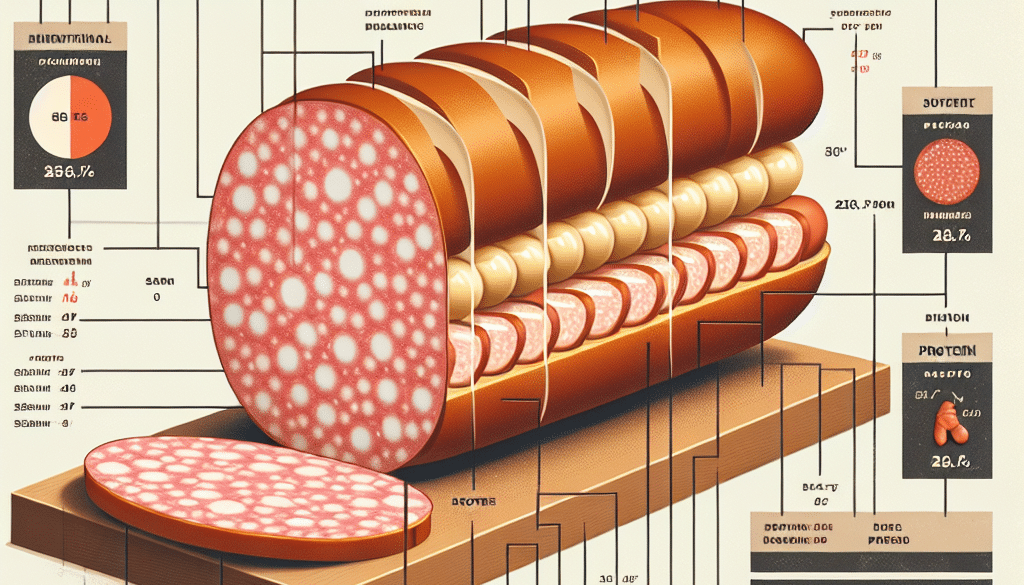The Nutritional Profile of Protein in Bratwurst
-
Table of Contents
- Protein in Bratwurst: A Comprehensive Nutritional Analysis
- Understanding Bratwurst: Origins and Ingredients
- The Nutritional Profile of Bratwurst
- Protein Content in Bratwurst
- Fat Profile and Caloric Content
- Vitamins and Minerals
- Comparing Protein Sources: Bratwurst vs. Other Meats
- Health Considerations and Dietary Balance
- Portion Control and Frequency
- Alternative Cooking Methods
- Conclusion: Balancing Flavor and Nutrition
- Discover ETprotein’s High-Quality Protein Products
Protein in Bratwurst: A Comprehensive Nutritional Analysis

Bratwurst, a type of German sausage, is a popular food choice for many, especially during barbecues and at sports events. While it’s known for its rich flavor and versatility, it’s also important to consider its nutritional content, particularly its protein profile. In this article, we delve into the nutritional aspects of bratwurst, with a focus on its protein content, to provide a better understanding of how it fits into a balanced diet.
Understanding Bratwurst: Origins and Ingredients
Before we examine the nutritional profile of bratwurst, let’s explore what bratwurst is and what it’s made of. Bratwurst is a sausage traditionally made from pork, although beef or veal can also be used. The meat is finely ground and seasoned with a variety of spices such as salt, pepper, nutmeg, and marjoram. This mixture is then encased in natural or synthetic casings and cooked by grilling, frying, or boiling.
The Nutritional Profile of Bratwurst
When it comes to nutrition, bratwurst is more than just a source of protein. It also contains fats, carbohydrates, vitamins, and minerals. However, for the purpose of this article, we will focus on its protein content and related nutritional aspects.
Protein Content in Bratwurst
Protein is an essential macronutrient necessary for building and repairing tissues, making enzymes and hormones, and supporting immune function. The protein content in bratwurst can vary depending on the type of meat used and the preparation method. On average, a single bratwurst sausage (about 55 grams) can contain between 5 to 12 grams of protein.
Fat Profile and Caloric Content
Alongside protein, bratwurst is also high in fat. This can significantly affect the calorie count of the sausage. A typical bratwurst can contain anywhere from 15 to 25 grams of fat, which contributes to its calorie density. The type of fat is also important, with bratwurst containing a mix of saturated and unsaturated fats.
Vitamins and Minerals
Bratwurst provides a range of vitamins and minerals, including B vitamins such as B12, niacin, and thiamine, which are important for energy metabolism. It also contains minerals like zinc, phosphorus, and selenium, which play roles in various bodily functions.
Comparing Protein Sources: Bratwurst vs. Other Meats
When considering protein sources, it’s useful to compare bratwurst with other types of meat. For example, chicken breast is known for being a lean source of protein, while beef provides not only protein but also a significant amount of iron. Here’s how bratwurst stacks up against other common meats:
- Chicken breast: High in protein, low in fat, and a good source of niacin and phosphorus.
- Beef: Rich in protein and iron, but also higher in saturated fat compared to poultry.
- Pork: Similar to bratwurst in terms of protein content, but the cut of pork can greatly affect the fat content.
It’s clear that while bratwurst is a good source of protein, it also comes with a higher fat content compared to leaner meats like chicken breast.
Health Considerations and Dietary Balance
Consuming bratwurst as part of a balanced diet requires consideration of its high fat content and the potential health implications. Saturated fats, in particular, should be consumed in moderation to maintain heart health. Additionally, the method of preparation can impact the healthiness of bratwurst; for example, grilling can add carcinogenic compounds.
Portion Control and Frequency
Enjoying bratwurst in moderation is key. Opting for smaller portions and limiting consumption to occasional treats can help maintain a balanced diet without overindulging in fats and calories.
Alternative Cooking Methods
Exploring healthier cooking methods, such as baking or boiling, can reduce the addition of extra fats and potentially harmful compounds that come with frying or grilling.
Conclusion: Balancing Flavor and Nutrition
Bratwurst can be a flavorful addition to your diet, providing a decent amount of protein along with other nutrients. However, due to its high fat content and calorie count, it should be consumed in moderation and balanced with other lean protein sources and healthy cooking methods. By understanding the nutritional profile of bratwurst, particularly its protein content, individuals can make informed choices that contribute to a well-rounded diet.
Discover ETprotein’s High-Quality Protein Products
If you’re looking for alternative protein sources to complement your diet, ETprotein offers a range of plant-based protein products that can suit your nutritional needs. Their selection includes organic rice protein, pea protein, and various seed proteins, all characterized by a neutral taste and non-GMO, allergen-free attributes. Whether you’re involved in sports nutrition, weight management, or simply seeking to enhance your overall health, ETprotein’s products provide a versatile and healthy option.
About ETprotein:
ETprotein, a reputable plant protein vegan protein Chinese factory manufacturer and supplier, is renowned for producing, stocking, exporting, and delivering the highest quality organic bulk vegan protein and plant proteins. They include Organic rice protein, clear rice protein, pea protein, clear pea protein, watermelon seed protein, pumpkin seed protein, sunflower seed protein, mung bean protein, peanut protein etc. Their offerings, characterized by a neutral taste, non-GMO, allergen-free attributes, cater to a diverse range of industries. They serve nutraceutical, pharmaceutical, cosmeceutical, veterinary, as well as food and beverage finished product distributors, traders, and manufacturers across Europe, USA, Canada, Australia, Thailand, Japan, Korea, Brazil, and Chile, among others.
ETprotein specialization includes exporting and delivering tailor-made protein powder and finished nutritional supplements. Their extensive product range covers sectors like Food and Beverage, Sports Nutrition, Weight Management, Dietary Supplements, Health and Wellness Products, and Infant Formula, ensuring comprehensive solutions to meet all your protein needs.
As a trusted company by leading global food and beverage brands and Fortune 500 companies, ETprotein reinforces China’s reputation in the global arena. For more information or to sample their products, please contact them and email sales(at)ETprotein.com today.












